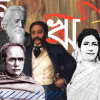Freeing literature from a colonial mindset
As an unregimented Anglo-American agent of English, it is generally expected from me to praise everything and anything "English" in Bangladesh. I have heard it, said it myself hundred times: you have to cultivate the "English" consciousness otherwise you will not be able to do … wait, yes, do what? Keeping aside the benefit of learning English in learning the world, the answer is, we will not be able to understand the literary canons from the West - the canons that still colonise our English syllabi in the universities with their former glories and stories. English history is thus perpetuated, made delightful; it is made somehow remunerative through texts that hail the old, even in a new intellectual atmosphere where Bangladeshi English academia is entering slowly but surely.
The presence of cultural and theory courses that discuss and analyse modern and postmodern critics and theories seriously alongside the "dead" ghosts of old writers makes it even more interesting because the approach towards texts has not yet totally changed. Even now some teachers of English literature are comfortable discussing only images, symbols, themes and motifs in the class, without, at any moment, referring to the social, psychological and cultural aspects/significance/insignificance of the text. A knowledge of these literary devices is a must, but as a slowly "post-modernising" nation, it is imperative for Bangladeshi English scholars to delve deeper into the text by going beyond the text itself and into the thick world of theory where issues that occasion a literary creation is analysed. We cannot afford any longer to be duped into believing and blindly accepting any inherent, foundational, propaganda-born discourse or structure that might re-ensure in us the "inheritance of a negative self-image".
The very presence of the old canonical texts in the English graduation syllabi and the absence of contemporary native or international literature (written in English) is a threat to our intellectual development because till date, most English graduates even from reputed public universities know only a few names of writers outside those they found in their syllabus, and even fewer theories.
This startling ignorance of contemporary literature also makes them incapable of understanding the theories in applied form. The problem lies not even only in this incapacity to read, understand and envision, but also somewhere else — somewhere more sensitive than anything. Unlike journalistic writing or history, literature tells us how things happen, through stories. Thus fiction gives us an insight into reality, from which it is born. Therefore it is of utmost necessity that besides merely getting informed about the world around us through newspapers and journals, we must also grow the ability to extract the valuable substance from contemporary literature—the substance that is infused with the writer's conscientiously chosen words, done after careful analysis of reality and mature response to real problems.
To know the real contemporary world, there is no other way than to acknowledge the plethora of contemporary literature and consider them seriously in the English syllabi, because as mentioned previously, knowledge of the modern/postmodern theories alone will do no good, because things are best understood as examples and not in their purely theoretical complexities; contemporary literature happens to rejoice in this theatricality of theories through its careful translation of the abstract into a story and vice versa.
This repetition of English canonical texts in the under and post-grad syllabi is a tool of Anglo-American imperialism because even if it does not do us any direct harm, it surely keeps us uninformed of the recent happenings in the subtle, behind-the-scenes, uncharted spaces of the world presented and represented through the grossly slighted contemporary works. The characters of a story speak of the sentiments, and often, they are the sentiments of the writer who must take refuge in an unreal world creating unreal personalities to express his anger and anxieties, his horrors and happiness, his interpretation of everything that cross him physically or mentally. If we keep ourselves away from knowing such contemporary characters, we will surely remain ignorant of the cognitive subtleties of great creative minds that can give us a deeper insight into present reality.
This does not mean that all Anglo-American texts have to be erased from our syllabi. This is where I am going to give a rather difficult challenge to our academics. While working for an Indian e-zine once, I came to know that students of English in India read authors like the Brontë sisters, Austen and Dickens when they are still in school. As a country adjacent to India, our colonial experience is very similar which is why it is so crucial to cultivate a non-colonial attitude towards literature. This is not to negate the West, but to empower the East and a small country like ours that holds bigger possibilities. My proposal is this- introduce the common canonical texts in school and college syllabi. With almost half of the texts transferred to the secondary/higher-secondary syllabi, it will be easy to accommodate theories and contemporary literature (both Eastern and Western) in the graduation syllabi of English studies. We need something like what Fanon said, though in a different way- before we can reclaim our past, we need to claim the present, otherwise this subjugation to a syllabus and an education system more than half a century old is going to keep us in dark and is going to keep us as experiment-specimens in the imperial laboratory of the West. Unless we pace up a little bit, we are going to end up as a nation which will always be the "other" even with all our so-called anti-colonial enterprises and outward, and hence superficial, manifestations of mere West-resisting-whim. Before we can even speak, let us learn what to speak about, and without updating our knowledge of the contemporary world and literature, we are just going to quote Mr. Shakespeare and be happy about it.
The writer is Lecturer of the Department of English, Varendra University, Rajshahi.

 For all latest news, follow The Daily Star's Google News channel.
For all latest news, follow The Daily Star's Google News channel. 








Comments